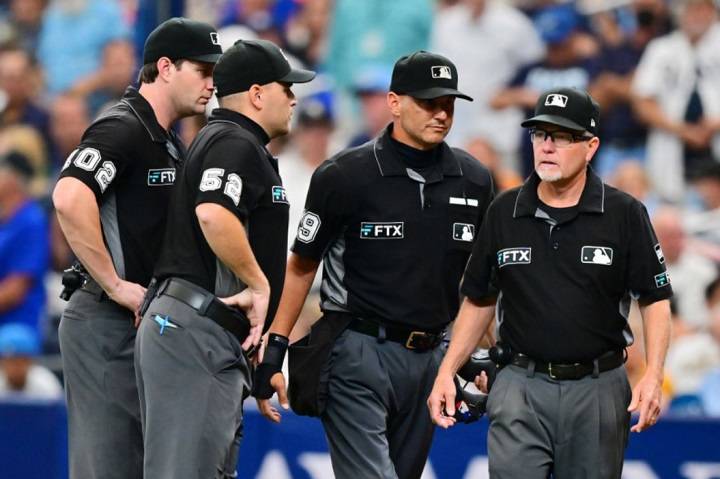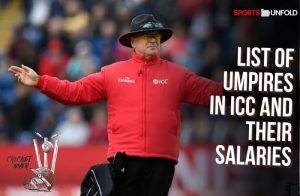In the grand theater of Major League Baseball (MLB), where every pitch, swing, and play is scrutinized with meticulous precision, the role of the umpire stands as a linchpin in ensuring the integrity and fairness of the game. Beyond the iconic blue uniforms and authoritative gestures lies a realm of nuanced discussions, one of which revolves around the often discreet topic of Major League umpire salaries. In this comprehensive exploration, we embark on a journey to unveil the intricacies of how umpires are compensated, the factors influencing their earnings, and the evolving landscape of umpire salaries in the world of professional baseball.
Understanding the Compensation Structure
Salary Basics for MLB Umpires
Base Salary:
At the core of an MLB umpire’s compensation is a base salary. This fixed amount forms the foundation of their earnings and is determined by factors such as experience, tenure in the league, and the overall hierarchy of umpires within MLB.
Experience and Tenure Tiers:
MLB umpires, like players, often progress through tiers of experience. Rookie umpires, those in their first few years in the league, may receive a different base salary than seasoned veterans. Additionally, the number of games umpired in previous seasons contributes to their overall tenure, impacting their earning potential.
Perks and Benefits
Per Diem and Travel Allowances:
Given the extensive travel demands of a baseball season, umpires receive per diem allowances to cover meals and incidental expenses while on the road. Travel allowances further contribute to ensuring that umpires can focus on their officiating duties without being burdened by logistical concerns.
Health and Retirement Benefits:
Umpires, like other employees, are entitled to comprehensive health and retirement benefits. These perks not only contribute to their overall well-being but also serve as incentives to attract and retain top officiating talent in the MLB.
Factors Influencing Umpire Salaries
Experience and Seniority
Career Progression:
As umpires gain experience and establish themselves in the league, they progress through a system that rewards seniority. More experienced umpires, having officiated a greater number of games, are often positioned to receive higher salaries and additional perks.
Postseason Opportunities:
Officiating games in the postseason is a prestigious honor for MLB umpires. Umpires selected for playoff assignments receive additional compensation for each game worked. The opportunity to officiate in high-stakes postseason matchups enhances an umpire’s overall earning potential.
Performance Evaluations
Merit-Based Increases:
Umpires undergo regular performance evaluations conducted by MLB. Merit-based increases in salary may be awarded to those who consistently demonstrate excellence in their officiating duties. These evaluations encompass not only rule knowledge and enforcement but also the ability to manage game situations effectively.
Review and Accountability:
Umpires are subject to scrutiny, and their decisions are often reviewed, especially in the era of advanced replay technologies. Accountability in making accurate calls and maintaining the integrity of the game contributes to an umpire’s standing within the league and may influence salary considerations.
The Evolution of Umpire Salaries in MLB
Historical Context
Earlier Compensation Models:
In the early days of baseball, umpires operated under different compensation models. Some were paid directly by the teams, leading to potential conflicts of interest. The establishment of centralized umpiring crews and league-wide oversight brought about standardized compensation structures.
Transformation over Decades:
The landscape of umpire salaries has transformed over the decades. From humble beginnings to the sophisticated and professionalized system in place today, the evolution reflects the growing significance of umpires in the context of MLB.
Collective Bargaining Agreements (CBAs)
Negotiating Compensation:
Umpires, like players, are part of collective bargaining agreements between the Major League Baseball Umpires Association (MLBUA) and MLB. These agreements outline the terms and conditions of umpire employment, including salary structures, benefits, and working conditions. Negotiations during the collective bargaining process play a pivotal role in shaping the financial aspects of umpire compensation.
Ensuring Fairness and Equity:
CBAs aim to ensure fairness and equity in umpire compensation. The negotiated agreements consider the interests of both the league and the umpires, striving for a balance that recognizes the contributions of officiating crews to the overall success and appeal of MLB.
Navigating the Challenges of Umpire Salaries
Public Perception and Criticism
Subject to Scrutiny:
Umpires, much like players, are subject to public scrutiny. Controversial calls, especially in high-stakes games, can lead to intense criticism. This scrutiny extends to discussions about umpire salaries, with some arguing that the compensation should be commensurate with the demands and expectations placed on officials.
Balancing Act:
Determining a fair and competitive salary for umpires requires a delicate balancing act. It involves recognizing the unique challenges of the profession while considering the financial dynamics of professional sports.
Technological Advances and Challenges
Impact of Replay Technology:
Advancements in technology, including instant replay, have altered the dynamics of officiating in baseball. While replay provides a mechanism for correcting egregious errors, it also adds an additional layer of pressure on umpires. The adaptation to and integration of technology into the game’s officiating processes may influence discussions about umpire salaries.
Embracing Technology:
Umpires must adapt to the evolving landscape of baseball, embracing technological tools to enhance accuracy and fairness. The willingness and ability to navigate the challenges posed by technological advancements may factor into considerations of umpire compensation.
Looking Ahead: Trends and Considerations
Diversity and Inclusivity
Inclusive Hiring Practices:
MLB, like many professional sports leagues, is placing increased emphasis on diversity and inclusivity. Inclusive hiring processes extend to officiating crews, and the league is actively working to cultivate a diverse pool of umpires. The recruitment and retention of umpires from different backgrounds contribute to a richer and more representative officiating cadre.
Impact on Compensation:
As the landscape of MLB umpires becomes more diverse, discussions about compensation must also consider factors such as equitable opportunities, representation, and the broader societal context of diversity and inclusion.
Fan Engagement and Entertainment Value
Enhancing the Fan Experience:
Umpires play a central role in shaping the fan experience. Their decisions, interactions with players and managers, and overall demeanor contribute to the entertainment value of the game. As MLB continues to explore ways to enhance fan engagement, the role of umpires in creating compelling narratives may influence compensation discussions.
Striking a Balance:
Achieving a balance between competitive salaries for umpires and the entertainment value they bring to the sport is a nuanced consideration. The league’s commitment to delivering an exciting and engaging product to fans is intertwined with the contributions of the officiating crews.
Related Post:
Decoding Basketball Fouls: Unveiling the Dynamics of Whistles and Penalties
Decoding Basketball Heights: Unveiling How Tall is Basketball Rim
Cricket Scoring Demystified: Decoding the Essence of Runs, Wickets, and Innings
In the realm of Major League Baseball, where every pitch carries the weight of anticipation and every call resonates through the stadium, umpires exist at the nexus of competition and integrity. Unveiling the intricacies of Major League umpire salaries provides a glimpse into the complex ecosystem that supports the officiating cadre, acknowledging their pivotal role in the sport’s narrative.
From the evolution of compensation structures to the challenges posed by technology and the ongoing efforts to enhance diversity and fan engagement, the trajectory of umpire salaries is intertwined with the broader story of professional baseball. As we continue to witness the unfolding drama on the diamond, the men and women donning the iconic blue uniforms remain both guardians of the game’s integrity and contributors to its timeless allure.






